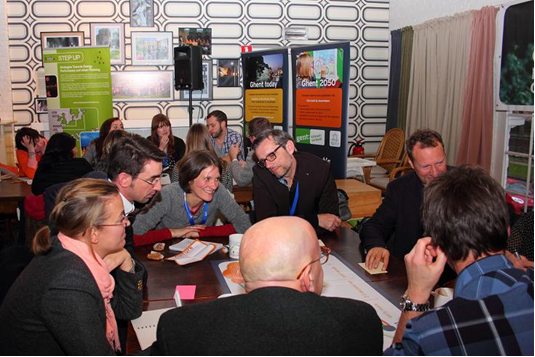Achieving sustainable city planning and development requires the support, commitment and involvement of a variety of public and private stakeholders.
Stakeholder
participation offers cities several key benefits:
Decisions taken with stakeholder input are based on a broader knowledge base
Stakeholder engagement from an early stage can improve the quality, acceptance and effectiveness of projects and proposals
Discussions with key stakeholders may open up further opportunities for collaboration and joint projects
Stakeholder buy-in helps secure long-term support for strategies and actions in the city
Participatory decision making is more robust and transparent
The first steps are to identify relevant stakeholders who:
- Have interests and activities relating to the issue in question
- Can provide information, expertise and resources required for effective policy making
- Are key players in ensuring successful implementation

There are numerous stakeholders within cities whose plans, aspirations, views and data sets can contribute to informed decision making with respect to sustainable energy planning. In the context of a SEAP, potential stakeholders may include local government administration, energy agencies, financial partners, institutional stakeholders, regional transport partnerships/agencies, built environment sector, private businesses, NGOs, workers' unions, educational establishments and consultants or organisations with specific expertise.
How to Engage in Stakeholder Participation
Undertaking a detailed analysis of key stakeholders is beneficial to understand stakeholder needs, priorities and interests, and to plan for effective engagement. For more information about different approaches to stakeholder analysis, view the STEP UP guide for cities here
Ongoing stakeholder engagement and collaboration is essential to effective planning. Different communication tools and approaches may be relevant to different stakeholder groups, such as:
- Information and Education - Brochures, newsletters and advertisements.
- Information and Feedback - Websites, surveys and questionnaires and public meetings.
- Involvement and Consultation - Workshops, focus groups and open house sessions.
- Extended Involvement - Community advisory committees, and citizens' juries.
Communication Strategy
Effective communication is essential to keep stakeholders well informed, motivated and keen to participate. In order to ensure that there is maximum impact of communication it is worth considering:-
-
Who is the key audience?
- What is the specific message to be conveyed and the desired outcome?
- Are the means of communication appropriate?
- How can the effectiveness of communication be evaluated?
Consideration of these points will support the development of a clear communication strategy, maximising impact and ensuring the appropriate stakeholders are engaged.
STEP UP approaches to stakeholder analysis and engagement The STEP UP partners have conducted extensive stakeholder analyses in their respective cities. The results have been used to ensure key stakeholders have been engaged during the development of city SEAPs, and this engagement will continue during the implementation of city projects and initiatives to achieve the EU2020 carbon reduction targets. To find out more about the approaches to stakeholder analysis and engagement taken by STEP UP cities, and key recommendations for other cities, download the summary report here. You can also read more about Ghent's stakeholder based approach in a presentation given by Indra Van Sande (Ghent City) at the STEP UP workshop in Brussels in April 2014. The presentation provides a background to Ghent's journey towards strengthened stakeholder engagement, testing new approaches and insights into developing Ghent's Climate Plan. Lessons learned in involving stakeholders in the process will be particularly useful to cities seeking to engage stakeholders more in their enhanced SEAPs. |  |
 Ghent - STEP UP - Brussels April 2014
Ghent - STEP UP - Brussels April 2014
The Glasgow STEP UP team have also developed a step-by-step guide to undertaking stakeholder analysis, prioritisation and engagement planning, based on the approach taken by the city and delivered as a training workshop to Scottish cities and organisations. The guide has been designed to help cities conduct their own stakeholder analysis, providing tips and practical advice. To find out more and download a copy, along with other useful resources click here
If you have any further enquiries about this work, please contact
info@stepupsmartcities.eu